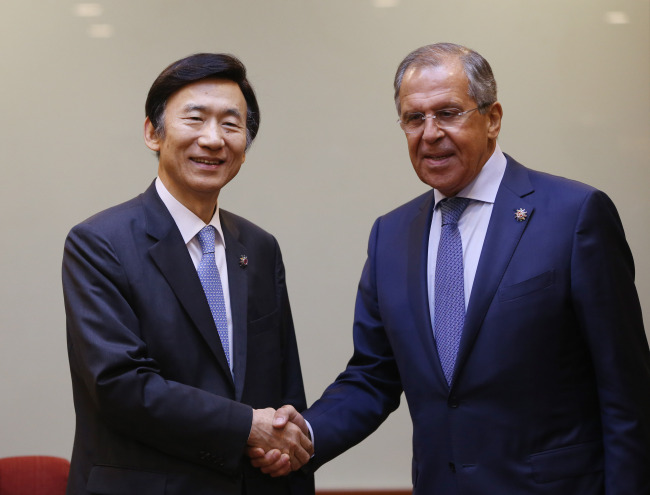South Korea’s Foreign Minister Yun Byung-se on Wednesday stepped up diplomacy to prevent North Korea’s possible provocations and the growth of its nuclear program, as he attended a series of bilateral and multilateral meetings involving Asia-Pacific nations in Malaysia.
On the sidelines of the ASEAN Regional Forum, high-level multilateral security talks involving 27 Asia-Pacific countries, Yun met with his counterparts from China and Russia to discuss North Korean threats, and other bilateral and regional issues.
On the sidelines of the ASEAN Regional Forum, high-level multilateral security talks involving 27 Asia-Pacific countries, Yun met with his counterparts from China and Russia to discuss North Korean threats, and other bilateral and regional issues.

During the separate meetings with Wang Yi of China and Sergey Lavrov of Russia, Yun called for their active roles to bring the North back to the dialogue table and pressure it to take the path of denuclearization.
Lowering the bar for the resumption of the long-stalled multilateral denuclearization talks, Seoul has called on Pyongyang to show up for unconditional “exploratory talks,” but the communist regime has rejected the overture.
Seoul previously demanded that Pyongyang first take “sincere steps” toward its denuclearization for the resumption of the six-party talks involving the two Koreas, the U.S., China, Japan and Russia.
Following last month’s landmark deal over Iran’s nuclear program, Seoul has been striving harder to create momentum to resolve the North Korean nuclear issue, with U.S. and Chinese officials citing the deal as a good model for resolving complicated international issues “through diplomacy.”
During Yun’s meetings with the Chinese and Russian counterparts, the issue of the U.S.’ potential deployment of the Terminal High-Altitude Area Defense asset might have also been discussed, observers noted, given that Beijing and Moscow have repeatedly voiced opposition to it, citing an impact on their security interests.
The issue of the escalating territorial disputes in the South China Sea, involving China, could also be touched on during bilateral and multilateral meetings there as it is one of the thorniest regional issues.
Apart from the denuclearization issue, Yun also focused on deterring North Korean provocations as speculation is growing that the North may engage in provocative acts such as a long-range rocket launch around Oct. 10, the 70th anniversary of the foundation of the North’s ruling Workers’ Party.
North Korea’s Foreign Minister Ri Su-yong also attended the ARF and other ASEAN-related meetings. Ri held bilateral talks with his counterparts from Russia, Pakistan and other nations. He was also expected to meet with Chinese Minister Wang Yi and others while in Malaysia.
At a dinner reception on Wednesday, the South Korean and North Korean ministers were expected to have an encounter, albeit unofficially. Surrounded by a throng of reporters, Ri indicated the possibility of his meeting with Yun, saying, “Don’t be too hasty as we have ample time, much work to do.”
The same day, Yun also had bilateral meetings with his Indonesian and EU counterparts. South Korea, the U.S. and Japan were also expected to hold bilateral and trilateral meetings on the sidelines of the multilateral forum.
Yun is to return to Seoul on Friday.
By Song Sang-ho (sshluck@heraldcorp.com)


![[AtoZ into Korean mind] Humor in Korea: Navigating the line between what's funny and not](http://res.heraldm.com/phpwas/restmb_idxmake.php?idx=644&simg=/content/image/2024/04/22/20240422050642_0.jpg&u=)

![[Exclusive] Korean military set to ban iPhones over 'security' concerns](http://res.heraldm.com/phpwas/restmb_idxmake.php?idx=644&simg=/content/image/2024/04/23/20240423050599_0.jpg&u=20240423183955)

![[Herald Interview] Why Toss invited hackers to penetrate its system](http://res.heraldm.com/phpwas/restmb_idxmake.php?idx=644&simg=/content/image/2024/04/22/20240422050569_0.jpg&u=20240422150649)
![[Graphic News] 77% of young Koreans still financially dependent](http://res.heraldm.com/phpwas/restmb_idxmake.php?idx=644&simg=/content/image/2024/04/22/20240422050762_0.gif&u=)






![[Exclusive] Korean military to ban iPhones over security issues](http://res.heraldm.com/phpwas/restmb_idxmake.php?idx=652&simg=/content/image/2024/04/23/20240423050599_0.jpg&u=20240423183955)



![[Today’s K-pop] Ateez confirms US tour details](http://res.heraldm.com/phpwas/restmb_idxmake.php?idx=642&simg=/content/image/2024/04/23/20240423050700_0.jpg&u=)